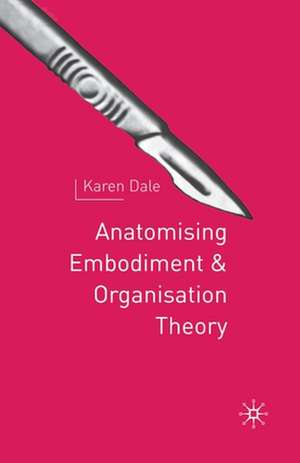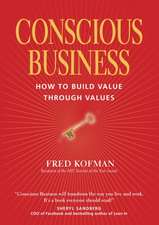Anatomising Embodiment and Organisation Theory
Autor K. Daleen Limba Engleză Paperback – 2001
| Toate formatele și edițiile | Preț | Express |
|---|---|---|
| Paperback (1) | 637.28 lei 6-8 săpt. | |
| Palgrave Macmillan UK – 2001 | 637.28 lei 6-8 săpt. | |
| Hardback (1) | 641.53 lei 6-8 săpt. | |
| Palgrave Macmillan UK – 8 noi 2000 | 641.53 lei 6-8 săpt. |
Preț: 637.28 lei
Preț vechi: 749.73 lei
-15% Nou
Puncte Express: 956
Preț estimativ în valută:
121.98€ • 132.54$ • 102.53£
121.98€ • 132.54$ • 102.53£
Carte tipărită la comandă
Livrare economică 21 aprilie-05 mai
Preluare comenzi: 021 569.72.76
Specificații
ISBN-13: 9781349399383
ISBN-10: 1349399388
Pagini: 249
Ilustrații: X, 249 p.
Dimensiuni: 140 x 216 mm
Greutate: 0.33 kg
Ediția:1st ed. 2001
Editura: Palgrave Macmillan UK
Colecția Palgrave Macmillan
Locul publicării:London, United Kingdom
ISBN-10: 1349399388
Pagini: 249
Ilustrații: X, 249 p.
Dimensiuni: 140 x 216 mm
Greutate: 0.33 kg
Ediția:1st ed. 2001
Editura: Palgrave Macmillan UK
Colecția Palgrave Macmillan
Locul publicării:London, United Kingdom
Cuprins
Introduction: Body Politics The Body and Organisation Studies Written on the Body: Social Theory and the Body Bodily Knowledge: An Approach to Embodied Subjectivity The Scalpel: An Introduction to the Anatomising Urge Under the Knife: Anatomising Organisation Theory The Mirror Replicating Organisation Conclusions
Recenzii
'Anatomising Embodiment and Organization Theory is an intriguing, deft and provocative overview of the emergence, embeddedness, and forgetfulness of organization studies in its interdependence with and constitution of a world premised on what the author terms an anatomising and ocular impulse towards the organic, and other, base metaphors of the field. The book questions the many binary divides, from Cartesian rationalism through to contemporary aesthetics of organization form and structure, that traverse and shape this field. It balances past normative masculine theorization of the field with a strongly argued feminization; it makes apparent implicit and covert social theories that appear as if they were asocial and, for those who take social theory seriously, it offers serious engagement.' - Stewart Clegg, Professor, School of Management, University of Technology, Sydney
'A well-researched, stimulating and provocative book that considers the 'anatomising urge' that characterises modern knowledge, of which organisational studies is a part. The author considers the production of knowledge that generates organisation theory and its foundations in dissection and fragmentation; privileging and hierarchy; and the implications this has for practices of exclusion. By illustrating the politics of claiming disciplinary boundaries, and challenging this by drawing from material more readily associated with medical sociology, anthropology, biology, and the sociology of thebody, the book destabilises conventional understandings of an area of study and is very welcome for this. Given the author's argument, any review must eschew the usual accolades of 'insightful', and 'going beneath the surface of' the subject, I hope, however, that this book will prompt a new body of research in a similar vein!' - Barbara Townley, Chair of Management and Organization Department of Business Studies and Management School, University of Edinburgh
'A well-researched, stimulating and provocative book that considers the 'anatomising urge' that characterises modern knowledge, of which organisational studies is a part. The author considers the production of knowledge that generates organisation theory and its foundations in dissection and fragmentation; privileging and hierarchy; and the implications this has for practices of exclusion. By illustrating the politics of claiming disciplinary boundaries, and challenging this by drawing from material more readily associated with medical sociology, anthropology, biology, and the sociology of thebody, the book destabilises conventional understandings of an area of study and is very welcome for this. Given the author's argument, any review must eschew the usual accolades of 'insightful', and 'going beneath the surface of' the subject, I hope, however, that this book will prompt a new body of research in a similar vein!' - Barbara Townley, Chair of Management and Organization Department of Business Studies and Management School, University of Edinburgh
Notă biografică
KAREN DALE is Lecturer in Industrial Relations and Organisational Behaviour at the University of Warwick. She has previously worked in the NHS and Local Government.



















